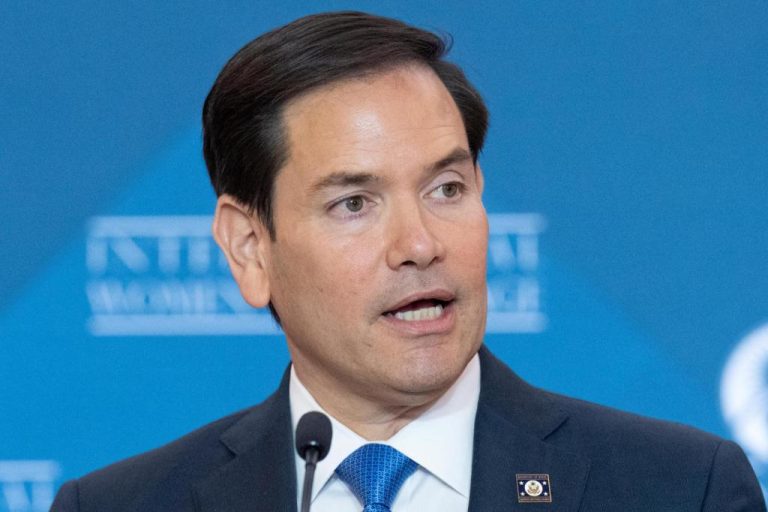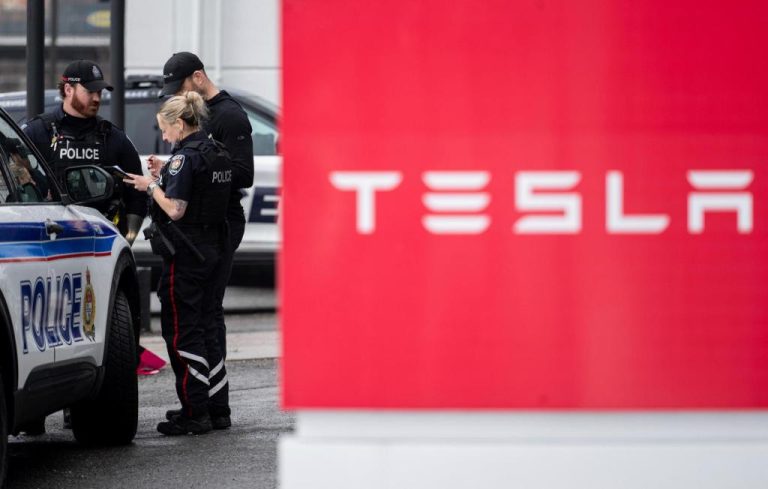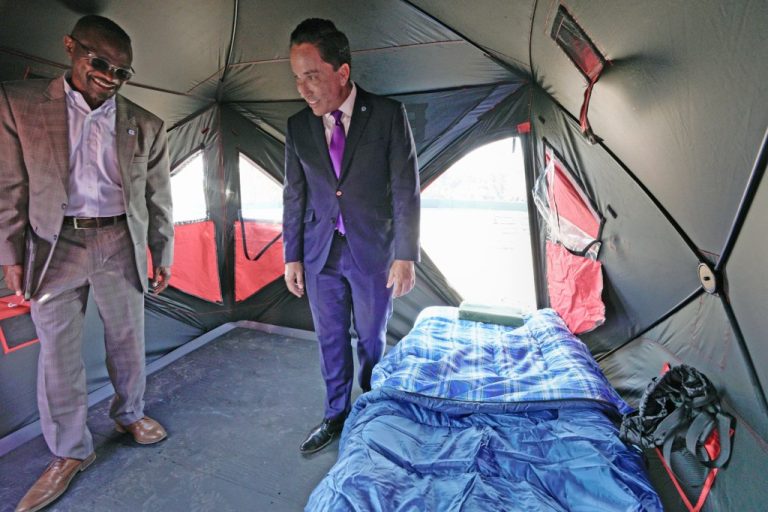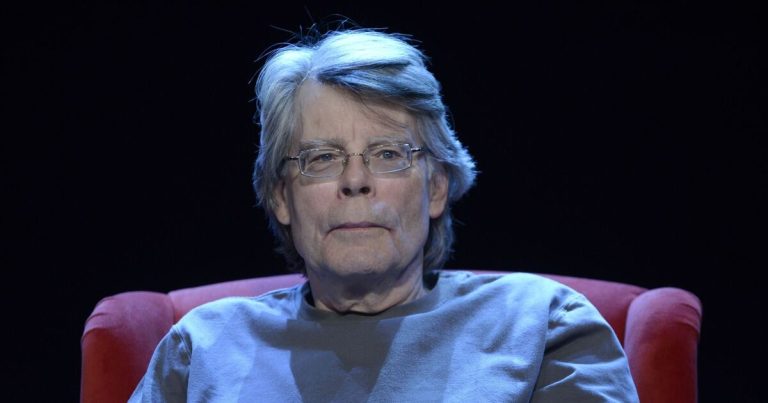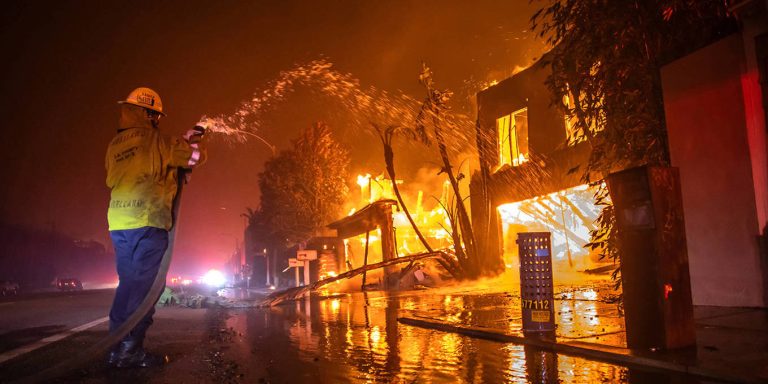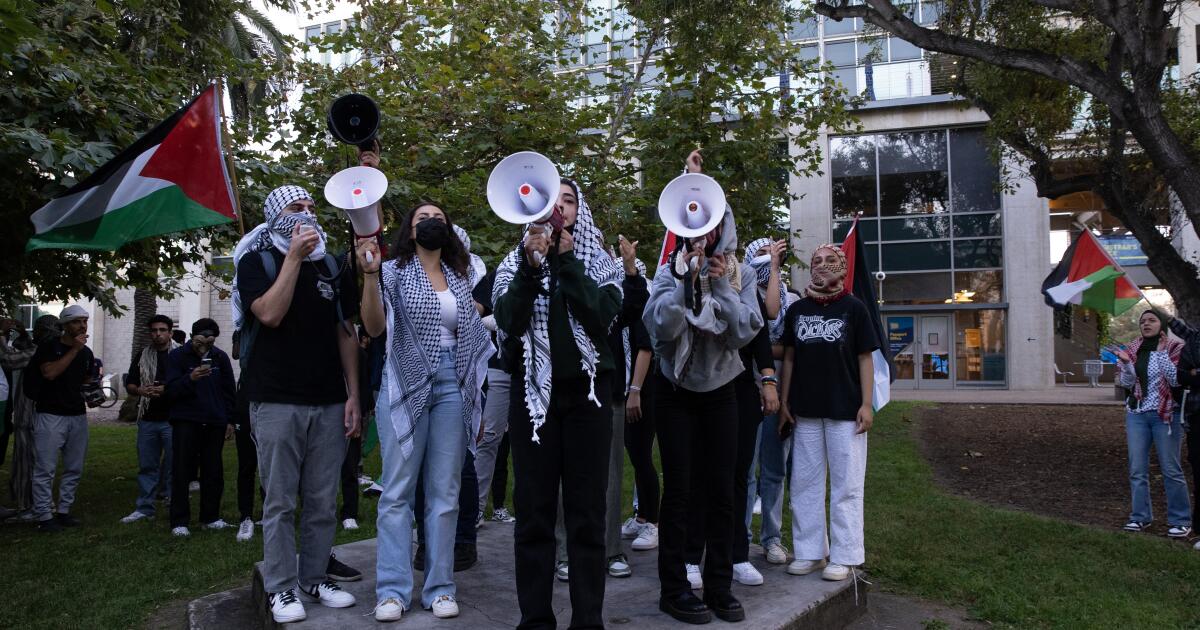
Why are brawny cops outside the door? Nothing rowdy ever happens when UC San Diego’s student leaders meet, right?
Usually, the answer is no. It’s known as a chill campus. But Associated Students, which helps oversee the school’s undergraduates, got caught in the political fallout from the Israel-Hamas war, and tempers are hot.
Having police around at AS Senate meetings suddenly seemed prudent.
The essence of the controversy is this: Competing interest groups, in different ways, asked AS to choose sides in the war. It’s the same demand that’s tearing at campuses across the nation.
The issue fully arose on Oct. 25 when Students for Justice in Palestine (SJP), without a place on the agenda, showed up at an AS meeting and pressed the board to endorse a statement saying that UCSD Chancellor Pradeep Khosla supports Israeli war crimes and won’t create a safe environment on campus for Palestinians and Muslims.
Two weeks earlier, Khosla had issued a statement that said, in part, “I write to express my unequivocal condemnation of Hamas’ horrific terrorist attack on Israel and targeting of civilians.”
He did not mention that not all Palestinians support Hamas.
SJP was equally blunt in addressing AS.
“They were saying things like ‘you’ve got blood on your hands, every second you wait people are dying,’ ” said George Chi Ioi Lo, the AS president.
SJP focused special attention on AS member Prityush Singh Goraya, a 17-year-old freshmen who tried to calmly explore the matter. Some members stood directly behind him as he spoke.
“It was OK,” Goraya later said. “They have a right to be here and speak.”
SJP’s statement said in part, “The University’s disregard for the killing of innocent civilians in Gaza is irresponsible, biased, and dehumanizes Palestinian life.
“Furthermore, the university’s implicit categoriization of Palestinians as ‘terrorists’ and ‘antisemitic’ perpetuates the racist notion that the offensive was unprovoke and done solely to be ‘launched on a major Jewish holiday.’ ”
AS went on to endorse the SJP statement, voting 24-0 in favor of the idea, even though some board members said they’d been rushed into making a decision. Many of them removed personal information from the AS for fear of having it used to threaten or intimidate them.
There were no abstentions.
SJP posted the news online for a global audience.

UCSD’s Associated Students board on Wednesday turned down a resolution condemning antisemitism on campus.
(Ana Ramirez/The San Diego Union-Tribune)
This infuriated Hillel, a group that represents Jewish students on campuses, including four schools in San Diego County. Hillel helped line up students to protest the vote at the next AS meeting, which came on Nov. 1.
Dozens of students spoke. Many said that they’ve been insulted and threatened by strangers on campus as the war has intensified.
The speakers included Gil Pasternak, who said he had to run for his life four years ago when a gunman burst into the Chabad of Poway synagogue and opened fire, killing one person and wounding three others.
“Words have consequences and a statement supporting one antisemitic organization is all the encouragement another might need,” said Pasternak, a UCSD student.
Few SJP members showed up to speak. But the group did briefly disrupt the meeting by chanting from a nearby spot outdoors.
Eventually, a new resolution was placed before AS. This one, written by the board, urged members to condemn antisemitism and to commit to the fair and equal treatment of the Jewish community on campus.
The vote wasn’t taken until well after midnight. The board’s offices closed at 11 p.m., and students had to disperse and regroup on Zoom.
In the end, six students voted for the resolution, 11 voted against it, and 9 abstained.
“Some board members were concerned that if they passed it the other side would just return next week and things would keep going back and forth,” said Ivan Ramirez, an AS member. “They didn’t want that.”
He added, “I think some of the comments people made in Senate meetings over the past week have contributed to antisemitism on campus.”

Shani Menna, a Jewish student at UCSD, decries antisemitism.
(Ana Ramirez/The San Diego Union-Tribune)
The action at UCSD and other schools worries Karen Parry,executive director of Hillel of San Diego.
“The campus climate is rapidly devolving,” Parry said. “Our universities are becoming breeding grounds for Jew hate. Jewish students don’t feel safe. It’s heartbreaking and terrifying to see civility deteriorating before our eyes and not enough is being done to quell it.
“We need strong university leadership to do the right thing now more than ever.”
The uproar largely stemmed from a public statement about the war that was made on October 9 by Rich Leib, a Jewish businessman from San Diego who chairs the University of California Board of Regents. The statement, co-authored by UC President Michael Drake, said in part:
“This was an act of terrorism, launched on a major Jewish holiday. What should have been a quiet weekend of rest turned into days of unspeakable terror and shock.”
Leib later tempered his remarks a bit, telling the Union-Tribune, “I’m only criticizing Hamas here. I know that many Palestinians are experiencing terrible suffering.”
Khosla added his own message to the statement one day later.
“I keep in my heart all innocent victims of this warfare and offer my condolences to their loved ones,” the message says, in part.
“As the ongoing devastation continues, I remain hopeful that those held in captivity will soon be safely returned home and that a peaceful resolution to this violence can be reached.”
Khosla’s message didn’t mention Palestinans, which was quickly noticed by SJP.
The group rarely talks to the news media. But Summer Ismail, a UCSD student and SJP member, told the Union-Tribune on Oct. 12, “We feel our stories are not being portrayed by the western media … We want a safe space to protest and mourn the death of loved ones and their families.
“This is unlike anything any of us have ever experienced. We feel like our very existence could be wiped out.”
Brian Keating, a prominent Jewish physicist at UCSD, also has been wrestling with the controversy. Among other things, he’s weighing whether to continue donating money to the university.
“I haven’t decided about donations,” he said. “I want to see how the administration reacts to this. They now face a profound test of principles. Will they affirm unequivocally that antisemitism has no place on this campus?”
Khosla declined to discuss such matters with the Union-Tribune. But Irwin Jacobs, the Jewish businessman who co-founded chipmaker Qualcomm, was willing to talk.
“I support free speech — as long as it doesn’t involve threats of violence,” said Jacobs, one of UCSD’s biggest donors. “And I’m not going to stop giving to the university. It’s not something that I would do.”

